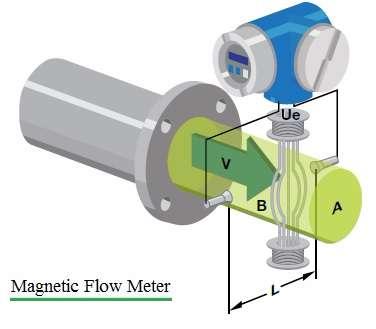Electromagnetic Flow Meter Basics and Advantages
Advertisement
This page covers electro-magnetic flow meter basics and advantages based on magnetic flow sensor technology. It explains the working operation of an electro-magnetic flow meter.
Flow meters are used in a wide variety of applications. They are often a key part of process control systems, especially in waste water treatment plants. They are also used in various industrial control processes such as food & beverage production, chemical/pharma, and the pulp & paper industries, etc.
The figure below illustrates a simple magnetic flow meter and its principle of operation.

Electro-magnetic flow meter
The electro-magnetic flow meter’s functionality is based on Faraday’s law of electro-magnetic induction. This law states that when a conductive fluid flows through the magnetic field of a sensor, an EMF (Electromotive force) is generated.
The EMF generated between a pair of electrodes is proportional to the volume flow of the liquid. Furthermore, the EMF is perpendicular to the flow direction and the direction of the magnetic field.
The amplitude of EMF can be expressed as follows:
E = K * B * D * v
Where:
- E = Induced electric potential
- K = Constant
- B = Magnetic Flux density
- D = Inner diameter of the measuring tube
- v = average velocity of fluid in the axial direction of the cross section of the electrodes
Advantages of Electro-magnetic Flow Meters
Following are the advantages of electro-magnetic flow meters:
- Electromagnetic sensors are placed inline within the pipe diameter. Hence, they do not obstruct the flow of the medium.
- As the sensors are not immersed in the liquid, there are no moving parts. This reduces tear and wear concerns.
- As the electro-magnetic flow measurement method depends only on the flow volume, changes in temperature, density, pressure, and viscosity don’t have any significant effect on the measurement.
- Due to the above reason, electro-magnetic flow meters can be used for any type of conductive fluid measurement once it is calibrated with water. Moreover, it typically does not require any additional amounts of correction factors.
Advertisement
 RF
RF







